People go to great lengths for those they love, especially when it comes to immigration reform.
deportation

On Oct. 11, I spent the morning under the front wheel of a bus filled with shackled immigrants. I joined this action with other community members to stop the two Homeland Security buses (operated by private contractor Wackenhut) from making it to the Operation Streamline proceedings at the Tucson federal courthouse. The buses were held and the front gate of the courthouse blocked for more than four hours, and Operation Streamline was ultimately cancelled for the day.
As my arms were locked around the wheels of the bus, I felt baptized into a deeper spirit of solidarity than I have ever known. Every one of the more than 70 immigrants on board those buses was shackled around their wrists and ankles. They were treated as if they were the biggest threats imaginable to our national security. During the action, the immigrants on the buses lifted their chains up to be seen through the darkened windows, and some of them put their palms together in front of their faces in a gesture of prayer and recognition of the meaning of the action. Other protestors at the scene had made signs in Spanish to communicate with the immigrants, with messages of: "Your struggle is our struggle;" "We are here defending your rights;" "You are not alone;" "We are with you, keep fighting;" "To desire a better life is not a crime."

THOSE WHO BELIEVE in freedom and work for justice in our world sometimes grow nostalgic about the 1960s in this country, looking back at the leadership that emerged from African-American churches in the South, drawing allies from outside the region and beyond the bounds of creed. America has a vivid, living memory of faith inspiring public justice. But the civil rights movement did not just happen. The March on Washington and Selma were moments in history made possible by movements that grew out of hard work over the course of decades.
This summer in North Carolina, “Moral Mondays” at the state General Assembly have drawn thousands of weekly protesters, more than 800 of whom have been arrested for engaging in mass civil disobedience. A few weeks into the campaign, some elders started saying it felt like the ’60s all over again. The Washington Post highlighted NAACP state chapter president Rev. William Barber’s dynamic preaching. The New York Times pointed to the significance of hundreds of clergy uniting to lead the movement. MSNBC andFox News set up their satellite trucks. Week after week, thousands of people kept coming.
When reporters asked why, participants explained the concerns: 500,000 people denied health care when the legislature refused federal funds for Medicaid expansion, 70,000 people whose unemployment insurance was cut off, thousands of poor families denied an earned income tax credit, wholesale repeal of the hard-won Racial Justice Act, and diversion of public education funds through a voucher program. The reasons were legion, but they were not, by and large, unique to North Carolina. They were the sort of changes the American Legislative Exchange Council (ALEC) promotes at the state level throughout the country. How, then, did this grassroots resistance movement emerge in North Carolina?
Despite the progress on immigration reform being made in the Senate, this week offered an unfortunate reminder of the uphill battle any legislation faces in the House of Representatives.
During it’s consideration of legislation funding the Department of Homeland Security, the House passed an amendment, authored by Iowa Republican Rep. Steve King, to defund the administration’s efforts of prosecutorial discretion. Specifically, it would require DHS to deport young, undocumented immigrants known as “DREAMers.” The amendment also puts at risk anyone who qualifies for prosecutorial discretion under the June 2011 John Morton Memos while in deportation proceedings.
Essentially, this amendment would categorize all undocumented immigrants aside violent criminals who must be deported if encountered by law enforcement, regardless of their circumstances or contributions.
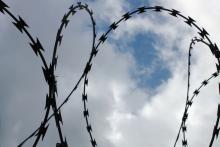
DURING CONGRESS’ current debate about immigration reform, the realities faced by immigrants and border communities are all too often misunderstood and misrepresented. What are the facts about border issues?
Myth #1: Border walls are effective for keeping out unauthorized border crossers.
Reality: History teaches us that walls don’t work when economic opportunity is on the other side—but walls that are higher and longer do cause more injuries and death when people are forced to go over, under, and around.
The most recent era of migration across the southern U.S. border was caused primarily by economic factors, as the North American Free Trade Agreement (NAFTA) caused millions of Mexican farmers to lose their livelihoods. The current border strategy, enacted hand in hand with NAFTA, envisioned deterring economic refugees by intentionally funneling migration to dangerous desert areas. The danger and death happened; the deterrence didn’t. It was the U.S. economic downturn, much more than the wall, that has caused the current net-zero immigration rate.
BREAKTHROUGHS ON immigration reform will make life easier for some Latino immigrants, but in the sweltering, often-toxic fields where farm workers toil each summer from Maine to California, conditions can still be dehumanizing and dangerous. There is a silver lining, however. With the burgeoning growth of the nation's Latino population, there are more advocates than ever working to improve the plight of the men, women, and often children who do hard labor on our nation's farms.
With a mostly young, deeply committed staff, the Florida-based Coalition of Immokalee Workers (CIW) is doing solid grassroots work to make life better for workers in the state's tomato industry. With cooperation from 11 food retail and food service corporations, CIW has implemented the Campaign for Fair Food, which has brought modest wage increases, worker protections, and grievance procedures to farms that produce 90 percent of the state's tomato crop.
Using a worker-led administrative structure and significant public pressure, CIW has brought companies such as McDonald's, Burger King, Pizza Hut, and KFC into its program that asks corporate partners to kick in an extra penny per pound for the tomatoes they buy. That premium is passed on to growers to increase worker pay.
Elbin Perez, 23, a farm worker from Guatemala, has been working in the U.S. for six years, sending part of his wages back home to his parents and five siblings. As a CIW member, Perez leads "worker-to-worker education programs." Those trainings educate workers about CIW's code of conduct, which growers have agreed to uphold. Reforms include use of time clocks, guaranteed minimum wage, and water and shade breaks.
AT TIMES IT SEEMS VERY HARD to realize that half a century has passed since my late wife, Rosemarie, and I were in Birmingham, Ala., living out a part of our years of service as representatives of the Mennonite churches of America to the Southern freedom movement—that historic black-led struggle for the expansion of democracy in America (inadequately labeled "the civil rights movement").
It was in the midst of those powerful days, in the late winter and early springtime of 1963, when our extraordinary people's movement was spreading to dozens of communities across the South, with some important reverberations in the North, and across the world as well. Usually initiated by courageous home-grown black leaders such as Rev. Fred Shuttlesworth of Birmingham and Victoria Gray of Palmers Crossing, Miss., the determined local groups often called upon national or South-wide organizations to help them in their campaigns.
Late in 1961, Shuttlesworth, who was part of the King-led Southern Christian Leadership Conference (SCLC), asked Martin Luther King Jr. and SCLC to come help the Birmingham movement. It faced a level of continuing white terrorism that led the black community to call their city "Bombingham," referring, of course, to the deadly violence they encountered whenever they attempted to challenge the white segregationist powers who were determined to keep black people in a submissive, separate, and dominated role.
When King and SCLC decided to respond to Shuttlesworth and move onto the Birmingham scene, Rosemarie and I were already friends and co-workers with Martin and Coretta, and King asked us to come participate in the struggle for the transformation of Birmingham. So we were present and in the line of marchers when King, his co-worker Ralph Abernathy, and others were arrested in early April 1963.

On a beautiful Sunday afternoon just a few weeks ago, a friend of mine courageously crawled under a Border Patrol truck. And he wasn't changing the oil. Raúl Alcaraz Ochoa was riding his bike to work when he came upon a scene that is all too common in southern Arizona, where racial profiling by the Tucson Police Department is permitted through the notorious legislation SB1070 and Border Patrol roam our streets. Multiple police cars and Border Patrol trucks were surrounding a vehicle apparently pulled over for traffic violation. When Raúl arrived, he saw five children crying for their father and a pregnant woman sitting terrified in the vehicle. Handcuffed and being transferred to Border Patrol custody was a Latino man named René.
Raúl had to think and act quickly, and he crawled under the Border Patrol truck. He began sending texts that spread quickly throughout a community protection network designed to alert community members and advocates about raids, abuse, and racial profiling by immigration and law enforcement. Media and supporters responded within minutes, just as Raúl was pepper sprayed, Tazed, and pulled out from under the vehicle. Both men spent the night in custody, and public demands were widespread for their release. While Raúl was released the next day, top officials of Border Patrol and the Department of Homeland Security ignored pleas for René to rejoin his family, and he was promptly deported to Mexico.
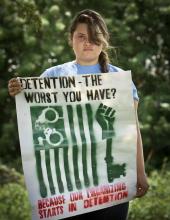
The Obama administration is not living up to its promises. Sign a petition to put an end to low-priority deportations.
ONCE UPON A TIME, long before there were birth certificates or Social Security numbers, there were immigrants. If you are or have been an immigrant without documents, you may think life must have been easier then, that you would never be afraid of getting found out and deported.
But life was not easier—at least not in the first century C.E., in the five mostly rural Roman provinces in what is now Turkey. Especially if you were a follower of Jesus.
As an immigrant, you are called by one of two names in Greek, the trade language of the time. You are a paroikos if you had fled or been forced from your native community for any personal, economic, or political reason and were trying to eke out a living in a foreign land. Oikos refers to "house" or the economic structure of the extended household in which native people lived. Para means "alongside of." In other words, you are "away from home," a resident alien on the edges of ordinary life.
Consequently, you have fewer rights than full citizens. Never able to own land, you are a sharecropper, a craftsperson, or perhaps a small trader or shopkeeper. You may have been driven off your land by high taxes you could not pay, or perhaps you are a second son and will not inherit your father's land. You may be the wife or daughter of such a man, or a widow driven to support yourself and your children. You have legal restrictions regarding intermarriage, commerce, and succession of property. You have no political rights, such as voting in public assemblies or joining in guilds. Unlike citizens, if you are charged with a crime, you can be tortured.
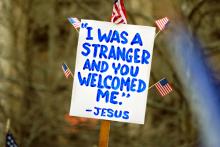
DURING THE SUMMER of 2003, 25 staff of InterVarsity Christian Fellowship and their families rode a bus through 10 states on the "Pilgrimage for Reconciliation." We retraced the Cherokee Trail of Tears and explored the journey of African Americans from slavery to the civil rights movement.
As we rolled over land that had witnessed the most evil individual acts and public policies enacted on American soil, and as we heard again and again how the church was either silent or complicit, we wondered aloud: "What issue will cause our grandchildren to look back at us and ask, 'Where were you?'"
There are many we could choose from. But on this day, approaching spring 2013—a decade after our pilgrimage, 50 years after Dr. King's "Letter from Birmingham Jail," 150 years after the Emancipation Proclamation—I know where I stand. On this day, I stand with my sisters and brothers in the church who are pressing our nation's leaders toward just and comprehensive immigration reform.
In the last three years, more than 1 million men, women, and children have been erased from our land through deportation. They were caught between two signs at our border: "Help Wanted" and "No Trespassing."
By law, only 5,000 "unskilled" workers are allowed into the U.S. through legal means each year. That is about the number of people processed on Ellis Island every day in the early 1900s. Meanwhile, our nation's industry and food supply rely heavily on the labor of immigrant populations. About 75 percent of all U.S. farmworkers are unauthorized immigrants. Then consider other industries: meatpacking, hospitality, restaurants, transportation. The disparity between the demand for workers and the supply is untenable.
ONE EVENING LAST July, I walked up to the Port Everglades U.S. border checkpoint in Fort Lauderdale, Fla., to intentionally turn myself in to U.S. Customs and Border Protection. My mission: to get into Broward Transitional Center, a privately run U.S. Immigration and Customs Enforcement (ICE) detention facility, to expose the stories of those held there. It's categorized by ICE as a model facility. But as I witnessed firsthand, it is nothing short of a prison where, as in the other 250 immigration prisons across the U.S., immigrants are arbitrarily held and exposed to all kinds of human rights abuses.
The total number of undocumented immigrants detained in the U.S. each year is sky-high—ICE detained 429,247 people in 2011 alone. In August 2011, the administration announced that it would focus its deportation efforts on people with criminal records. "Obama is only deporting gangbangers and felons," established immigrant advocacy organizations said. "He's our guy for immigration reform!"
But that is far from true. In my work with the National Immigrant Youth Alliance (NIYA), I keep hearing the real stories of immigrant prisoners and the loved ones from whom they're torn.
Getting detained was part of a strategy of civil disobedience that fellow activists and I have been pursuing since 2010: In order to pressure ICE and the government, we have to put ourselves on the line. I was one of two Youth Alliance activists who sought to infiltrate the Broward Center to find out the inside story. We also set up a telephone hotline, funded by donations from the community, to take calls from people detained in the center.
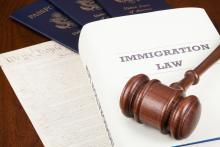
Five year-old Tony Amorim sat with his dad in a van in Danbury, Conn., in 1989.
“Do you want to come with me,” his father asked him, “or do you want to stay with your mother?”
Tony loved them both, but the boy couldn’t imagine living without his father.
“I want to go with you,” Tony answered.
Right then and there Tony’s father drove away and took him to the far-away land of Florida.
Last week, I interviewed Tony, now 28, on the phone. I couldn’t call him directly because he is in Norfolk County Correctional Center awaiting his deportation hearing scheduled for today.
Tony’s voice was tight. He was eager to share his story — his whole story.
On the face of it, his case is simple. According to a Notice to Appear, issued to him by the Department of Homeland Security, Tony is a native and citizen of Brazil who entered the U.S. through Orlando, Fla., on a Nonimmigrant Visitor for Pleasure Visa in 1985. In 1995, Tony was granted Lawful Permanent Resident status by an immigration judge. He was 11 years old. In 2004 he was arrested and convicted for possession of narcotics. Four years later he was arrested and convicted again for possession of narcotics with intent to sell and for possession of a pistol.
It sounds like Tony is the poster child for the kind of person who should be deported: two felony convictions and possession of a gun. But you haven’t heard the whole story.
As a privileged child growing up in suburbia, I could never imagine losing my parents. I am incredibly thankful for the opportunities they gave me, and the love they have poured out on me for as long as I can remember.
“You’ll understand once you have a child, Brandon,” my dad has told me countless times in a sort of sage-like way. Without saying, we both acknowledge that I will not understand the love parents have for their children until I have a child of my own.
But, even if I could not comprehend the love my parents had for me, I am able to understand that I could not be who I am today — more likely, I would not be much of anything — without their presence in my life. And that’s not to say that anyone missing a parent cannot function.
But thousands of children to parents living in the U.S. without citizenship are abruptly forced to carry on without one or both of their parents, as a record number of people are being deported from the U.S. According to Immigration and Customs Enforcement (ICE), nearly 45,000 parents were removed in the first six months of this year.
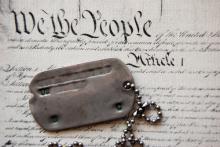
When I go out with my Dad, he often wears a cap identifying him as a Korean War veteran. Over and over again, people tell him, “Thank you for serving.” Over and over again.
I’m always struck by the contrast between that appreciation and the sad, hidden truth about our country’s treatment of some other veterans. I’m speaking of the government’s detention and deportation of many immigrants who served in our armed forces but who are not yet citizens.
The first time I heard about this was 1998. My friend’s husband, a Canadian who grew up in Texas and chose to serve in Vietnam had recently gotten a deportation order based on some old drug charges, the kind of thing many vets experienced. What horrified me then, and still does today, is that immigration judges could not grant an exception. Nothing could stop the deportation except a change in U.S. immigration laws.

Today, two Christian leaders in Arizona delivered a petition signed by thousands of Christians to Gov. Jan Brewer calling on her to retract her controversial executive order denying driver’s licenses and other benefits to undocumented young people who qualify for deferred action. The petition was signed by members of the Sojourners community and reads:
We believe every person, regardless of immigration status, is created in God's image. Your recent executive order denying driver's licenses and other benefits to undocumented young people who qualify for deferred action is harsh and short-sighted. As people of faith, we urge you to reconsider your position and retract this executive order so that all God's children in Arizona can contribute to your state's economy and strengthen its communities.
Pastor Yvette Lopez of the New Life Church of God in Tucson, Ariz., also helped deliver the petition.
“I’m a conservative, but this is this was the last straw for me,” Lopez said.“This executive order is deplorable, and it must be rescinded; my faith and my politics demand this.”
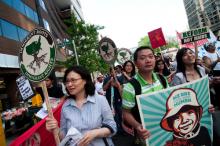
As many as 1.4 million undocumented immigrant youth — aka “DREAMers” — would qualify for temporary work permits and be shielded from deportation once President Obama's DREAMer relief goes into effect August 15.
I am one of these DREAMers.
I came to this country from Peru when I was five years old. While I miss my homeland, I’ve come also to appreciate and thrive in my new one.
I’ve volunteered in my community at museums, schools, and hospice centers. I’ve had the privilege also of attending one of the top private, liberal arts schools in the nation and now am continuing my education as a mental health counseling graduate student.
President Obama’s DREAMer relief finally will give DREAMers such as me a chance to fully engage in this country. I finally will be able to work and, like the rest of my peers, get to experience the joys and challenges of being gainfully employed.

Editor's Note: A recent news report recounted how activists with the National Immigrant Youth Alliance have placed themselves intentionally in deportation proceedings in order to enter the Broward Transitional Center, an immigration detention facility in Florida. They say they encountered scores of detainees who shouldn't be there under the Obama administration's revised deportation policies. What follows is a first-person account by one of the detainees, Marco Saavedra, a former intern at Sojourners.
I am glad the stories we are finding in this detention center are getting back to you all out there. My name is Marco Saavedra and recently I put myself into deportation proceedings hoping they'd bring me to the Broward Detention Center.
Despite being a DREAMer, the border patrol office I approached looking for a missing friend didn't think twice about detaining me. Little did they know they were doing exactly what we wanted, bringing us to this detention center filled with low-priority detainees.
No one deserves to be locked up like they are inside of this facility.
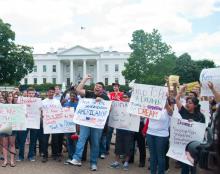
Dreams came alive today as President Obama granted relief to thousands of undocumented students. While the decision does not create a pathway to citizenship, it eliminates the threat of deportation for many unauthorized students and makes them eligible for work permits.
Sponsored by Casa de Maryland, a number of organizations—Amnesty International, Jews United for Justice, 32BJ SEIU, National Council of La Raza, and the National Gay & Lesbian Taskforce—participated in a rally in front of the White House to celebrate the president’s announcement.
This just in from the Associated Press:
"The Obama administration said Monday it arrested more than 3,100 immigrants who were illegally in the country and who were convicted of serious crimes or otherwise considered fugitives or threats to national security. It was part of a six-day nationwide sweep that the government described as the largest of its kind."
The sweep involved more than 1,900 U.S. Immigration and Customs Enforcement officers and agents. According to ICE, more than 1,000 of the people arrested had multiple criminal convictions. The totals included an estimated 50 gang members and 149 convicted sex offenders, other serious offenses included murder, manslaughter, drug trafficking and sexual crimes against minors. It appears to be a response to earlier suggestions that ICE would not vigorously pursue immigrants who are veterans, elderly, lived in the U.S. since they were children, or have relatives who are citizens of legal residents.